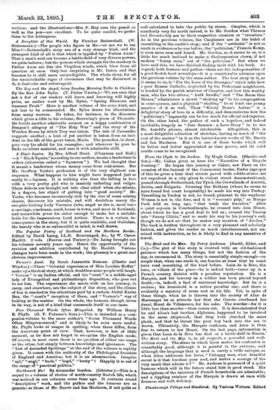Northward Ho! By Alexander Gordon. (Isbister.)—This is a sequel to
a volume of stories of north-country Scotch life, which was noticed in our columns some time ago. It contains sound "descriptive" work, and the pathos and the humour are as genuine as those of Mr. Barrie and Ian Maclaren, if not quite so well calculated to take the public by storm. Carglen, which is manifestly very far north indeed, is to Mr. Gordon what Thrums and Drumtochly are to their respective creators or " revealers." Is in the previous volume, the Cargleners are in the habit of assembling in the smith's shop; and if the " awtheist " is not so much in evidence as he was before, the "politician," Francie Kemp, is even more seen and heard.. Mr. Gordon, as it seems to us, is a little too much inclined to make a Shakespearian clown, if not modern "funny man," out of "the politician." But when we have said this, we have finished finding fault with his book. As regards both humour and pathos—these are the indispensables of a good Scotch book nowadays—it is a considerable advance upon the previous volume by the same author. The best story in it, as it seems to us, is "For the Love of the Stranger," which tells how a poor Roman Catholic, neglected by his Protestant neighbours, is tended by the parish minister of Carglen, and. how this worthy man, who has two aliases," Auld Snuffle," and "The Beam that Shines," administers a moral "shaking up" to his congregation in consequence, and a physical " shaking" to at least one young member of it as well. Then " Kirsty Dean's Letter" is a delightful story of love in a difficulty, and demonstrates how the "politician's" ingenuity can be too much for official red-tapeism. On the other hand, the pathos of such a hopeless, and indeed inevitable, tragedy as "Jess Samson : a Love Story" is, to use Mr. Arnold's phrase, almost intolerable. Altogether, this is a most delightful collection of sketches, having as much of "the root of the matter" in it as the better-known works of Mr. Barrie and Ian Maclaren. But it is one of those books which will be better and better appreciated as time passes, and its solid merits come to be recognised.






































 Previous page
Previous page